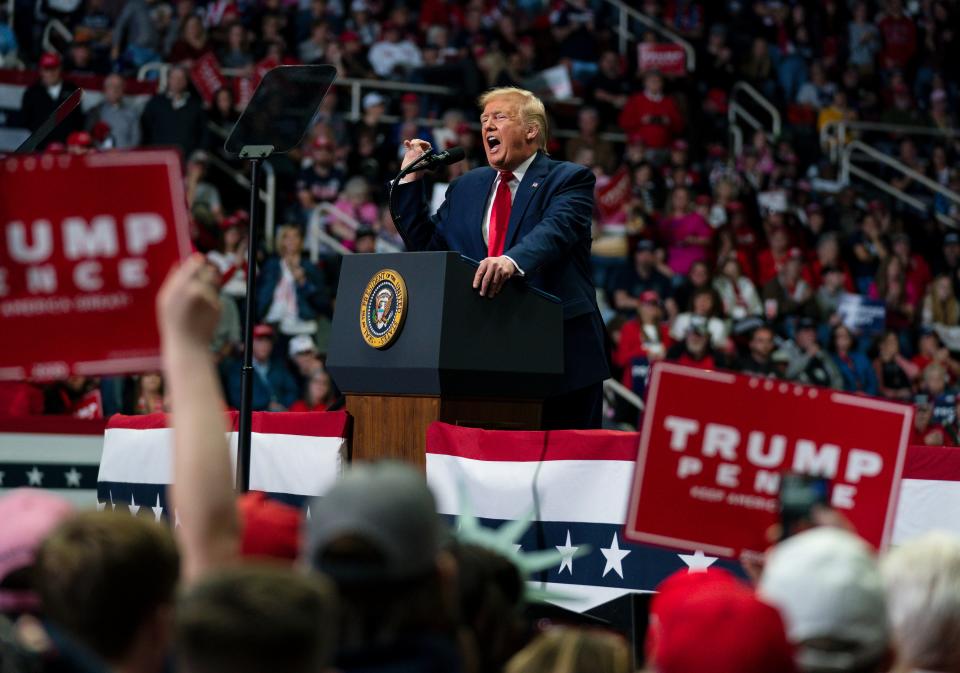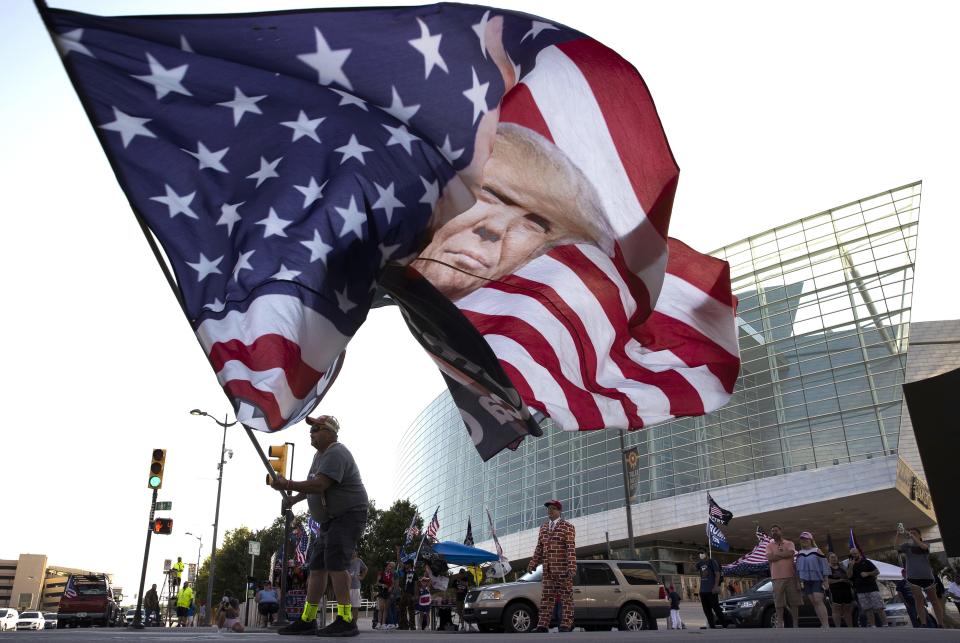'Turning point' or massive risk? Trump gambles with a rally in Tulsa that could shape his campaign
TULSA, Okla. – When President Donald Trump returns to the campaign trail for a rally here Saturday he’ll be taking a high-stakes gamble that could set the pace of the presidential race for at least the rest of the summer, GOP allies and observers say.
Trump's rally – his first since he addressed supporters in early March in North Carolina – has the potential to kickstart his struggling reelection effort, quiet critics questioning the wisdom of massive indoor events during the coronavirus pandemic and deliver to the White House a powerful talking point in the increasingly partisan battle over reopening.
It could also backfire: Undermining Trump’s rosy assertions about the course of the virus – and his administration’s response to it – at a time when his support is at a low point.
"They're definitely taking a risk with this," said Amy Koch, a Minnesota-based Republican strategist. "If there isn't a spike, if there isn’t some kind of a ground zero effect, it’s going to embolden him – and it's going to mean more rallies."
On the other hand, if public health experts' fears about the rally becoming a "super spreader" event are realized, it would almost certainly delay future rallies and undercut the president's message that the country is on course for a quick recovery.
The risks to the rally were underscored by an extraordinary series of events that began Thursday night when Tulsa Mayor G.T. Bynum set a three-night curfew, citing the expected crowds of more than 100,000, the planned protests, and the civil unrest that has already erupted in the city and around the nation.
The tighter security meant Trump supporters lined up for the rally had to be moved further away from the 19,000-seat BOK Center. Some supporters had been camping out for days to get a good spot and the curfew raised questions about whether they would be able to remain near the site overnight Friday.
By Friday afternoon, the curfew was lifted after Bynum and Trump spoke by phone – a decision that was announced first by Trump on Twitter and then confirmed by the mayor.
Coronavirus: Health experts fear Trump's rally could turn into a 'super spreader' event
Trump is expected to touch down in the Sooner State – one of the reddest states in the nation – around dinnertime and host his first rally since the coronavirus was declared a pandemic. As he strolls onto the stage in the BOK Center, with Lee Greenwood’s “God Bless the USA” pouring through the speakers, he’ll face a dramatically different political scene than the one he was navigating three months ago.

More than 119,000 Americans have died from the virus, according to Johns Hopkins University. Several states, including Oklahoma, are experiencing alarming increases in new daily cases. The death of George Floyd, a Black man whose neck was pinned to the ground under the knee of a white police officer, sparked massive protests and has forced a reexamination of racism and police conduct. The unemployment rate has spiraled to levels not seen since the Great Depression.
Amid the crises, Trump's polling numbers have been sliding. Former Vice President Joe Biden, the presumptive Democratic nominee, had a double-digit lead in a nationwide Fox News survey this week. Other independent polls show Biden running up the margins in Wisconsin, Florida, Michigan and Pennsylvania – all critical battlegrounds.
More: Biden holds an 11-point lead over Trump as age, gender fault lines emerge, new survey shows
Tulsa could be a show of strength
Trump has described the Tulsa rally as the start of his campaign (though he had already held 10 rallies this year before the virus locked down businesses and schools). Republican allies predicted a massive turnout in Tulsa would not only send a message of strength but also give him a morale boost at a time when little else has gone his way.
Supporters also view the rally as a chance for Trump to draw a contrast with Biden, who has avoided large events during the pandemic. Officials with the Biden campaign declined to comment about the rally.
"A successful rally would be the launching pad for the rest of campaign season," predicted Rep. Kevin Hern, an Oklahoma Republican who is planning to attend the rally. "Resuming the campaign rallies will force Joe Biden out of the basement and back onto the campaign trail, proving that Biden cannot compete with Trump."

If there is not a spike in cases after the event, and if protests around the venue remain peaceful, several Republicans predicted the outcome would ease the campaign’s ability to organize future rallies – which Trump is eager to do. It could also help the GOP put on a full-scale convention, alleviating concerns delegates might have about attending.
"Restarting Trump's rallies is the Democrats' worst nightmare,” asserted Republican Lance Cargill, a former speaker of the state's House of Representatives and now a political consultant. “Whether or not there is a spike in coronavirus cases, the point can and should be made that the lockdown-shutdown has run its course."
The Trump campaign said the rally drew interest from more than a million people and that it expects tens of thousands to show. Among those who lined up early for the event was Rosie Matlock, who was seated in a blue folding chair and said she had kept her spot in line since Wednesday. The 68-year-old predicted the rally would be "a turning point" for Trump and like a "dose of medicine."
Still, none of those predictions are a given. Public health officials in Oklahoma have warned against the rally for days, particularly given the recent spike in daily cases in the state. Oklahoma cases of COVID-19 rose by 450 on Thursday, blowing past the record of 259 cases a day earlier, according to the Oklahoma State Health Department.
Trump's rally also poses big risks
The rally has already run into roadblocks: The campaign had to reschedule after it initially set the event for Juneteenth, the holiday celebrating the end of slavery in the United States. Trump has also faced a backlash for holding the rally in a city that was by many accounts home to one of the worst racial attacks in U.S. history.
And then there is the virus.
Jonathan Reiner, professor of medicine at George Washington University, described the rally as a terrible idea "because it's a crowded indoor venue, without the limit on attendees that would allow for adequate social distancing, and no requirement for face masks, in a city with rising COVID cases."
Bynum wrote this week that the rally wasn’t his idea and said he shares the "anxiety about having a full house" for the event. Dr. Anthony Fauci, director of the National Institute of Allergy and Infectious Diseases, told CBS News Radio this week that large congregations of people heighten the risk.
"There's no doubt that it increases it," he said.
And both Fauci and Dr. Deborah Birx, who has led the White House coronavirus response, raised concerns in recent days about the safety of the rally, NBC News reported Friday. The BOK Center, meanwhile, sent a letter to the Trump campaign late Thursday seeking more information about the campaign’s plan to keep attendees safe.

White House officials and Gov. Kevin Stitt, a Republican, have insisted that the rally can take place safely. Stitt, who visited Trump at the White House on Thursday, said that hospitalizations remain low in the state.
"Oklahoma is ready for your visit. It's going to be safe," Stitt told Trump. "And we're really, really excited."
Trump and White House officials have noted that the campaign will distribute masks and hand sanitizer and check the temperature of attendees. The campaign did not respond to questions from USA TODAY this week about the cost of that equipment or the vendors for the supplies.
While rally attendees will receive masks, they won’t be required to wear them. They have also been asked to waive their rights to sue the Trump campaign if they get sick. But Trump officials have pushed back on the idea that the rally is gamble.
"We are confident that we can operate safely in Tulsa," White House spokeswoman Kayleigh McEnany said Friday, adding that she would not wear a mask at the event.
Veteran Republican operative Stuart Stevens, a frequent Trump critic, questioned the notion that a successful rally would help the president reignite his campaign, though he predicted the president will declare it a success no matter how it turns out.
“I tend to think that Trump having rallies is bad for Trump,” said Stevens, arguing that the president is already “overexposed” on the virus and other issues.
“When is the last time Trump inserted himself in a situation and it benefited him?” Stevens asked. “As long as this race is about Trump he's going to lose.”
Contributing: The Oklahoman
This article originally appeared on USA TODAY: Trump's rally in Tulsa comes amid a spike of coronavirus cases
